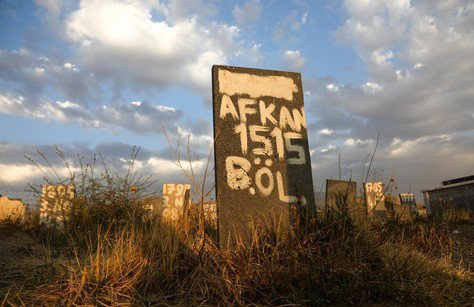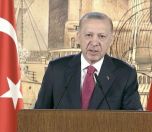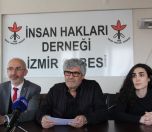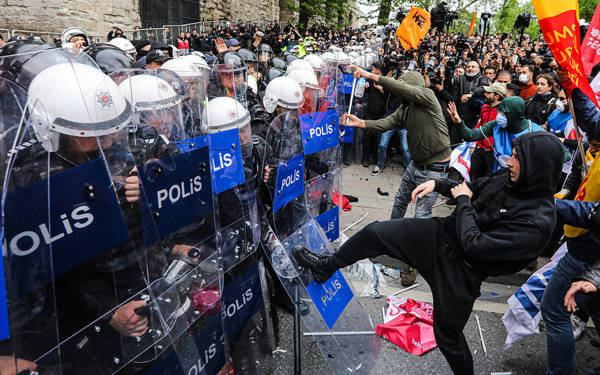Click to read the article in Turkish
This article has been published as part of the "Resilience in Journalism" article series which sets out to offer critical reviews exemplifying hate speech and disinformation in the media as part of the Resilience Project, of which the IPS Communication Foundation / bianet from Turkey is one of the partners. |
Even though hate has existed as an emotion throughout the history of humanity, it has never been a global motivation to organize against refugees. Of course, today's social networks that come with the internet technology provide the necessary opportunities for this organization almost completely. People who abandon the places they live because of wars, natural disasters or economic reasons are becoming the common target of hate speech in the globalizing world today.
Scum of the earth
In her book "The Origins of Totalitarianism-2 Imperialism," American political scientist Hannah Arendt says the trinity of state-people-territory makes up the nation state and refugees have become a great danger that is a candidate to disrupt this trinity. In the same book, she describes refugees as follows: "Once they had left their homeland they remained homeless, once they had left their state, they became stateless; once they had been deprived of their human rights, they were rightless, the scum of the earth."
 August 2021, Van, the foreigners' (common) grave
August 2021, Van, the foreigners' (common) grave
The destructiveness of and borders changed by World Wars I and II forced millions of people, especially in Europe, to go to safe places from the lands they were born in the last century. The United Nations High Commissioner for Refugees, which was founded in 1950 by the United Nations General Assembly, defines a refugee as follows, according to the 1951 convention:
"A person who has a well-founded fear of being persecuted for reasons of race, religion, nationality, membership of a particular social group or political opinion, is outside the country of their nationality and, owing to such fear, is unable or unwilling to return to it."
Also, article 14 of the Universal Declaration of Human Rights renders the provision that "Everyone has the right to seek and to enjoy in other countries asylum from persecution."
It is pledged that the rights of all refugees who are waiting at the borders of Europe today, who have been sent back or lost their lives, will be guaranteed by the signatory countries.
Saying that anti-refugee hate speech is fueled by the uncertainty and fear caused by the mass migration movements, rights advocate and lawyer Fecri Şengür notes that people who cannot become citizens are deprived of fundamental human rights in the places they go to.
"There is an article in the Constitution that they cannot be deported, their entrance to the country cannot be prevented. Or the issue of the right to work... These are defined as citizens' rights, but these rights do not exist or are subject to permits for refugees. The rights defined in the United Nations Human Rights Declaration are, in practice, applied only within the country that the person is a citizen of.
Open to attacks
Being pushed out of the shield of citizenship by leaving their homes, refugees, as "the scum of the earth," become vulnerable to all kinds of attacks. This vulnerable situation also turns refugees into either propaganda material for populist leaders who do "civil rights advocacy" with exploitative rhetoric, or the frontline of hybrid wars of conflicting powers like in the border of Greece in February 2020 or in the border of Poland today.
Saying that anti-refugees are mostly lower or middle-class citizens, Şengür notes, "These people fear losing the privileges arising from civil rights because of refugees."
According to the data of the United Nations High Commissioner for Refugees (UNHCR), because of the humanitarian crisis that started in 2011 in Syria, Turkey hosts 3,614,108 people as of June 13, 2019. 64.1% of those who had to flee Syria due to the crisis have taken refuge in Turkey.
.jpg) Edirne, Turkey-Greece border, February 2020. Refugees returning from the border.
Edirne, Turkey-Greece border, February 2020. Refugees returning from the border.
The situation of the Syrians in Turkey
The most common statements, especially for Syrians, are unfounded claims such as they do not pay taxes when they open a business or the state pays the bills of their homes and businesses. One of the main arguments of anti-refugees is that refugees cause unemployment and high living costs. However, AKP Vice Chair Mehmet Özhaseki, with his statements during a TV broadcast he participated in July, confirms that refugees mean cheap and insecure workforce for capital owners: "They keep the industry afloat in some cities. Look at the industry in Gaziantep. Hundreds of thousands of people work in the hardest and most difficult jobs."
According to the "Syrian Refugees in the Turkish Labor Market" study published by the International Labor Organization (ILO) in February 2020, about 950 thousand Syrians work in Turkey. However, the share of those who informally are as high as 91.6 percent. Moreover, the number of working Syrians aged between 5-14 reaches 130 thousand.
Reports reveal that the cause of unemployment is not refugees; on the contrary, refugees have to work for the lowest wages, do all kinds of heavy work in businesses and are exposed to labor exploitation the most.
Disinformation about Syrians
It is also very common and always up-to-date disinformation that Syrians receive unrequited salaries from the state. We have witnessed many times in the past that this disinformation, combined with hate speech, had horrible consequences. In a street interview published last October, an old man's words to a young Syrian woman, "I lost my job because of you, the rents have increased, I can't pay my rent because of you, I can't eat bananas, you eat kilos of bananas" became a talking point. After this video spread, the reaction against the Syrians who shared videos while eating bananas on social media turned into lynch. Following growing reactions on social media, 44 foreign nationals identified were detained and taken to removal centers to be deported to their countries.
"Invaders"
Another issue is the ghettoization of poor neighborhoods and refugees bringing their culture to these places. Even though the dominance of common languages and cultures in common living spaces is a natural consequence, this situation is often defined as "occupation" in social networks. As a result of this, all the "invaders" are blamed for the judicial cases involving refugees. In August 2021, a person from Turkey was killed in a fight between two groups, one of which was Syrian, in Ankara's Altındağ district. Rapidly organizing on social networks after the death news, residents of the neighborhoods threw stones at homes and businesses of Syrians and flipped some cars. Later, it was understood from interviews with residents of the neighborhood that the reaction was not against crimes or criminals but people who were angry because of the changing demographics triggered a social lynch attempt, citing a judicial case as the reason.
However, at the end of the day, the Syrians were put in buses and taken to a place they did not know, to start all over again, on the grounds of "reducing the tension." Similar incidents have happened many times in different cities at different times, and the relocation of refugees for a solution shows that neither the government nor the opposition has policies to prevent violence against refugees.
"The wrong editors"
We often witness how the language and images used in reports about refugees are manipulated in the hands of "wrong editors." After the Taliban took over Afghanistan last August, the efforts of the people who wanted to leave the country, some of which ended in death, were imprinted on the memories of many of us.
In the news about refugees who were fleeing a country with such an atmosphere, images and the phrase of "young male Afghans" were often emphasized. With populist leaders also involved, the young people from Afghanistan also caused panic in the European public, especially in Turkey. While some of the people from Afghanistan who were criminalized with questions targeting them, such as "Who are these young people?", "Why aren't there any women and children?", "Where are the elderly?" were deported to Iran after being detained, those who managed to reach the metropolises quietly settled in the ghettos established by the Afghans.
Seyit of Afghanistan
Seyit, who lives in one of these ghettos, talks about his journey. Seyit, who is 16 years old, came to İstanbul at the end of June. We meet him at the basement of an apartment building in Sarıgazi, where many Afghan refugees live. While he was living in the rural parts of the Faryab province in Afghanistan's north, his studentship ended after the Taliban closed the schools. He has two siblings, one 10 and the other 15 years old. Seyit says that his father sold all his property to finance his journey and adds: "My elder brother was a police officer. He was killed by the Taliban six months ago. They also burned my uncle alive in a car because he worked for the state. I want to live."
He also finds it difficult to describe his difficult journey that lasted for a month: "We came to Pakistan from the Afghan border with smugglers. From there, we went to Iran. Iran was bad. We walked for days along the mountains. Sometimes 10-15 of us were getting into the cars arranged by the smugglers. Once, we traveled one day in the back of an oil tanker, without seeing the light, with the smell of diesel. We were lucky we didn't die."
Of course, everyone was not as "lucky" as Seyit. Noting that he had witnessed the deaths of 12-13 people during the hard journey, Seyit says, "The weather was sometimes very cold. We saw snow and rain. Sometimes it was very hot; we had no water. Some had no clothes and money. There were children, they were younger than me. We left us behind. I don't know what happened to them. Even siblings could not look at each other, everyone was trying to save their own lives. Smugglers were torturing us on the road, there were incidents of robbery in Pakistan."
They had set off with 60 people, and, after a month, 30 people were able to reach the border of Turkey, says Seyit. "Those who were left behind were either caught or killed. They were left in the mountains. The police of Iran sent some of them back to Afghanistan. When we came to the border of Turkey, we crossed the border on foot, together with the smugglers. Those who had money got into cars."
In a group of eight people whom I encountered under a bridge on the road to Van, the oldest one was 17 years old and the youngest one was 14 years old. They had traveled over 3 thousand kilometers between Afghanistan and Turkey in 55 days. The children whom I communicated through hand gestures said they had been hungry and without water for days. They had also been subjected to violence by smugglers. They would try to travel to İstanbul from Van in the country that they do not speak the language of.
.jpg) August 2021, Van. The 6 children mentioned in the article / Permission was given for the use of the photograph.
August 2021, Van. The 6 children mentioned in the article / Permission was given for the use of the photograph.
"You are traitors"
Of course, we can write similar stories about tens of thousands of people. But, these two stories alone would be enough for people who want to establish a cause-and-effect relationship about what the journey of death means and only the young and the strong can travel on this road.
Nationalist/militarist groups among anti-refugees mostly accuse the refugees of treason to their homelands. You should have defended your homeland, you are cowards fleeing the war, you are traitors". It can be clearly understood from the arguments they presented in street interviews or on social media that most of the people who say these have not witnessed a real battlefield and that they did not have any idea about the countries where civil wars were taking place.
As understood from our interviews with Syrian refugees, the parties to the civil war that has been going on for 9 years do not promise prosperity and freedom to the peoples of Syria in real terms. In this proxy war with an international dimension, the efforts to determine who will have the power in Syria, which has geopolitical importance in the Middle East, has destroyed the country's historical background, as well as its cities and economy.
Muhammed of Syria
As the Syrian soil was turned into an international jihadist swamp, incurable wounds opened between different ethnic groups and sects. Muhammed (27), who crossed into Turkey with his family one night in 2015, tells how he lost his spouse and child, saying, "The FSA militants had settled on the first floor. Our home was on the top floor. Planes struck the building." He says no place was left in Syria for them to live and describes his Syria in Turkish, which he speaks very little: "Assad is cruel, the FSA are thieves and looters, ISIS are murderers anyway... There is no life there."
It is understood that the refugees' desire to live arises from the belief that the ideas fought for are not worth dying for rather than treason.
Of course, we don't always encounter anti-refugee hate speech as a concrete aggression that includes violence and insult. Today, the migration issue, which is a global talking point from Asia to Europe and the United States of America, has become the main agenda of politics in many countries.
The refugee card in power struggles
Of course, this issue is used as an argument of psychological warfare that the government and the opposition used to expand their spheres of influence because Turkey is a major station on the migration route. In other words, while the main opposition parties use the issue of refugees to press the government of AKP Chair and President Recep Tayyip Erdoğan, the Erdoğan government uses it as a trump card against the European Union to overcome its political and economic deadlocks.
Of course, the consequences of these political maneuvers in Turkey directly affect the lives of about 7 million refugees. We see main opposition Republican People's Party Chair Kemal Kılıçdaroğlu's statement that "When I come to power, I will send all refugees back to their countries with a flourish of trumpets" and the practices of Bolu Municipality, which is led by the same party, that "We will give water to foreigners in dollars (12 times more expensive) and we will charge those who want to get married in Bolu 100 thousand lira (the minimum wage was 2,850 lira)."
The readmission agreement and the death of 34 soldiers
.jpg) Fatih, İstanbul, February 2020. Refugees being brought to the border with Greece.
Fatih, İstanbul, February 2020. Refugees being brought to the border with Greece.
The refugee crisis between the Erdoğan government and the EU in February 2020 has caused tens of thousands of asylum seekers to live in appalling conditions for months. The agreement with the EU on March 18, 2016, included not only the issue of millions of Syrian refugees going from Turkey to Europe, but also the revival of Turkey-EU accession negotiations, which had slowed down. More importantly, Turkey demanded that the rest of the money that the EU had promised for refugees be transferred directly to Turkish non-governmental organizations, without any bureaucratic obstacles.
When Russia's Ministry of Defense made a statement on February 27, 2020, saying that Turkey had violated the Sochi Agreement by "continuing to support illegal armed groups," planes of the Syrian Air Force bombed areas thatwhere the Turkish Armed Forces were also present and 34 Turkish soldiers lost their lives. Erdoğan, who was not able to get the support it expected from the EU countries, most of which are also NATO members, in a sudden decision, announced that Turkey had opened the doors of Europe to refugees. A day after the announcement, tens of thousands of refugees were brought from various cities of Turkey, especially from İstanbul, to Edirne, the border with Greece. Minister of Interior Süleyman Soylu spreading disinformation with a post on his Twitter account on March 6, 2020, saying, "As of 12.10, the number of refugees who left Turkey and crossed into Greece through Evros: 142,175," the mainstream media reporting on thousands of refugees reaching Europe every day and law enforcement forces organizing crossings near the border etc. showed that this process was carried out as a state policy against the EU.
.jpg) Edirne, the border with Greece, February 2020. Refugees having a rest in the buffer zone.
Edirne, the border with Greece, February 2020. Refugees having a rest in the buffer zone.
Of course, a vast majority of the refugees did not succeed in crossing the border. People whom the Erdoğan government made to believe that they could go to Europe had sold everything they had in a hurry and had to live in the buffer zone between Turkey and Greece for months because they had nowhere to return. Moreover, these happened in a period when the world was in lockdown because of the COVID-19 pandemic. No one claimed responsibility for this horrific tragedy, the losses were not compensated.
The Belarus-Poland border
Today, we are experiencing the same scenario on the Belarus-Poland border, with a heavier toll. Inspired by Erdoğan's refugee move in 2020, Belarus' leader, Alexander Lukashenko, filled the EU's border with thousands of refugees. The refugees, most of whom are citizens of the Iraq Kurdistan Regional Government, paid tens of thousands of dollars to international smuggling networks to go to Belarus' capital, Minsk.
The refugees whom I spoke to said they had gone to Minsk with the visas they got from the Belarus Consulate and then they were brought to the border, escorted by the Belarus police. We don't know how many of the refugees, who dealt with hunger and thirst for weeks in winter conditions, lost their lives on the border because of disease outbreaks and bad weather conditions. However, every refugee we talked to said they had witnessed at least one death while waiting on the border, and there were the elderly, women and children among the killed.
From the Mediterranean Sea to the Aegean Sea and to Belarus, the borders of the EU have turned into refugee graves because of the "policies of hatred," which are created by nation states and otherizes people. The stateless peoples whose rights arising from life have been usurped, are fleeing the spiral of violence in the Middle East for the same reasons as they fled the Nazi Germany in the past. Those who produce hate speech on social media with the hashtag #RefugeesNotWelcome have to see that the rights granted to refugees will also protect them or their children in the future.
Our responsibility, as journalists and humans, is to say that "They don't have a home to return to'' with the visual content and human stories we produce. Refugee rights are a litmus paper for public conscience. Today, refugees are a phenomenon that makes the existence and necessity of borders in the world questioned. The world we live in does not offer many choices to us with regards to this issue; we will either equally share the earth in a way befitting human dignity, or we will live as witnesses of the extinction of humankind.
About the Resilience project
Funded by the European Union The regional program 'RESILIENCE: Civil society action to reaffirm media freedom and counter disinformation and hateful propaganda in Western Balkans and Turkey' is implemented with the financial support of the European Union by partner organizations SEENPM, Albanian Media Institute, Mediacentar Sarajevo, Kosovo 2.0, Montenegrin Media Institute, Macedonian Institute for Media, Novi Sad School of Journalism, Peace Institute and bianet. This article was produced with the financial support of the European Union. Its contents are the sole responsibility of bianet and do not necessarily reflect the views of the European Union. You can have detailed information about the project here. Click here for the first report. Click here for the second report. Click here for the factsheet on Turkey |
Resilience in Journalism Articles
Where does hate speech stand, where does freedom of expression? / Nazan Özcan
The hate of the Fourth Estate / Eren Topuz
Media's hate for the colors of the rainbow / Selay Dalaklı
Media in Kurdish threatened with extinction in Turkey / Murat Bayram
(MB/NÖ/VK)





.jpg)



